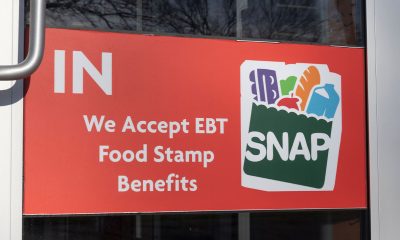Politics
States to Test Ways to Send Food Stamp Recipients to Work
#NNPA BlackPress
COMMENTARY: The National Protest Must Be Accompanied with Our Votes
Just as Trump is gathering election data like having the FBI take all the election data in Georgia from the 2020 election, so must we organize in preparation for the coming primary season to have the right people on ballots in each Republican district, so that we can regain control of the House of Representatives and by doing so, restore the separation of powers and balance that our democracy is being deprived of.
Activism
Congresswoman Simon Votes Against Department of Homeland Security, ICE Funding
“They need accountability. Republicans already gave these agencies an unprecedented $170 billion for immigration enforcement, funding they have used to conduct raids at schools, separate families, and deploy a masked paramilitary who refuse to identify themselves on American streets. This bill gives them more funding without a single reform to stop unconstitutional, immoral abuses,” she said.
Activism
Post Newspaper Invites NNPA to Join Nationwide Probate Reform Initiative
The Post’s Probate Reform Group meets the first Thursday of every month via Zoom and invites the public to attend. The Post is making the initiative national and will submit information from its monthly meeting to the NNPA to educate, advocate, and inform its readers.
-

 #NNPA BlackPress4 weeks ago
#NNPA BlackPress4 weeks agoJefferson County (AL) Democrats Open Qualifying for 2026 Primary Elections
-

 #NNPA BlackPress4 weeks ago
#NNPA BlackPress4 weeks agoSkater Emmanuel Savary Sharpens Routines for the 2026 U.S. Championships
-

 #NNPA BlackPress4 weeks ago
#NNPA BlackPress4 weeks agoCOMMENTARY: With Gratitude and Praise for 2026
-

 #NNPA BlackPress4 weeks ago
#NNPA BlackPress4 weeks agoFrom Civil Rights to ICE Raids, Trump’s Unchecked Power Puts Every Community at Risk
-

 #NNPA BlackPress4 weeks ago
#NNPA BlackPress4 weeks agoFrom Civil Rights to ICE Raids, Trump’s Unchecked Power Puts Every Community at Risk
-

 #NNPA BlackPress3 weeks ago
#NNPA BlackPress3 weeks agoOP-ED: The Dream Cannot be Realized Without Financial Freedom
-

 #NNPA BlackPress4 weeks ago
#NNPA BlackPress4 weeks agoTravis Scott Teaches Us How to Give Forward
-

 #NNPA BlackPress3 weeks ago
#NNPA BlackPress3 weeks agoFour Stolen Futures: Will H-E-B Do The Right Thing?






























































